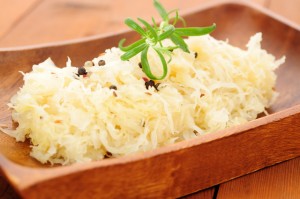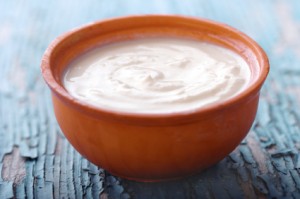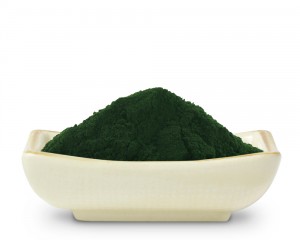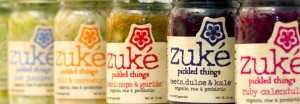Originally Posted on Chopra.com
As Hippocrates said, “All health begins in the gut.” While your digestion is known as the root of your health, eating for a healthy digestion can be both complex and confusing. The overall quality of food has diminished through over-processing, and the busyness and stress of modern life can wreak havoc on your digestive systems.
Below you will find some healing and nourishing foods to help your digestion
1. Chia Seeds
You may not realize that these tiny little seeds are a nutritious, protein-filled, and fat- and fiber-rich addition to any digestive healing plan. Chia seeds add a gentle and gelatinous fiber to your diet for healthy digestion.
How to enjoy: For best results and optimal digestion, chia seeds should be soaked for a minimum of 20 minutes in your liquid of choice - such as milk or milk alternative, herbal tea, water, kefir, yogurt, or diluted juice - at an approximately two-to-one ration of liquid to chia. After 20 minutes of soaking, the chia seeds become gelatinous, soft little pockets of wonder that are easier to digest and that go with almost any flavor profile. Top with your favorite fruit, shredded coconut, a dollop of raw honey, or a dash of cinnamon. Add to a smoothie for extra protein, fiber, and fat. Toss into your yogurt or kefir for a digestive healing snack.
2. Apple Cider Vinegar (ACV)
This enzyme and probiotic-rich, age-old vinegar has been found to contain many elements that benefit digestive health. The natural acidity of apple cider vinegar balances the delicate PH of your body, in turn, supporting your digestion. Consequently, ACV helps to combat bad bacteria in the gut and restore the microbiome - the delicate system of microbes in your gut - to its optimal balance.
How to enjoy: Mix a small amount of apple cider vinegar (one teaspoon) into a glass of water and drink it daily to support your digestion, and help to rid the body of harmful toxins.
3. Lemon
While a squeeze of lemon comes in handy in many recipes - over a salad or on a piece of wild salmon - warm lemon water has been support the liver function. In one study, lemon water was helpful in alleviating constipation in overweight women. Lemons are an easy food to keep around, and warm lemon water is a wonderful beverage to include in your morning routine.
How to enjoy: For best digestive support, use warm water (approximately 100 degrees) when preparing your lemon water as optimal digestion occurs at your body temperature. Buy organic lemons whenever possible.
4. Mint
You may have sipped on a warm cup of peppermint tea or grown wild mint in your herb garden, but did you know that peppermint is a soothing remedy to help your digestion? Menthol, the oil found in peppermint (and other variations of mint), has been shown to relax the muscles of the digestive tract. Notably, studies show that using mint (specifically the oil from peppermint) as part of your digestive support strategy can alleviate indigestion, IBS (irritable bowel syndrome) symptoms, gas, and bloating.
How to enjoy: Make yourself a warm cup of peppermint tea with a teaspoon of raw honey to drink during or after a meal. Take two peppermint oil capsules before each meal to relax and ease your digestion.
5. Yogurt or Kefir
These dairy-based cultures are common probiotic-rich foods made primarily from goat, milk, and cow milk. Yogurt and kefir are found in many varieties all over the world.
Research shows that symptoms of IBS, such as bloating and diarrhea, will improve with a diet rich in probiotic foods. Probiotic-rich foods, such as yogurt or kefir (a fermented milk drink), have also been shown to repair candida overgrowth (an imbalance of yeast in the microbiome).
Look for organic, sugar-free (sweeten with a little bit of honey if desired) yogurt or kefir made from the milk of grass-fed cows, goats, or sheep. Choose varieties that are high in probiotic bacteria such as L. acidophilus, L. casei, B. bifidum, L. rhamnosus GG, and B. Longum.
How to enjoy: Add yogurt or kefir to your morning smoothie or pour over your favorite granola. Or mix one cup with four tablespoons of chia seeds and let soak for a minimum of 20 minutes until the chia seeds are softened and then top with your favorite fruit.
6. Apples
In addition to keeping the doctor away, apples have earned their iconic status in the health and wellness field. Apple pectin - a type of soluble fiber present in apples - is known to support strong and healthy digestion in rats (studies in human have not been done). Apples are chock full of antioxidants and fiber, protecting the cells in the lining of the gut and keeping you regular.
How to enjoy: The best thing about apples is that you can eat them just as they are - enjoying a sweet, tart, and juicy delight. Apples also make a great travel snack paired with nuts or nut butter. Try baking them into a traditional apple pie while substituting sugar with a natural sweetener such as raw honey, maple syrup, or coconut sugar. Grate apples over your breakfast oats with a dash of cinnamon for a warming fall breakfast. Try juicing your apples with a few vegetables such as celery and ginger, for a digestive-boosting juice.
7. Bone Broth
While you may have heard a lot about bone broth, and tasted it from your grandmother’s soup pot or at a local health food store, you may not realize that not only is it simple to make, but it is also a medicinal nourishing tonic that can aid your digestion.
Some of the most effective and healing ingredients in a slow-cooked bone broth are the amino acids derived from the protein - specifically L-glutamine and collagen. If you suffer from food allergies, leaky gut syndrome, autoimmune symptoms, or IBS, L-gutamine makes a wonderful addition to your digestive healing regimen.
Research shows that L-glutamine rebuilds and strengthens the digestive lining (which thins and permeates during digestive illness). One study showed that serum collagen (a protein found in bone broth) is diminished in the digestive tract of patients with inflammatory bowel disease.
How to enjoy: Enjoy as a broth or a base for a soup or stew - or simply add your favorite herbs and spices and sip out of your favorite mug.
The root of your health begins with a strong and efficient digestion. Choosing your food carefully, adding healing foods, slowing down, and bringing mindfulness to your eating will make a positive impact on your digestion and your long-term health. Learning what healing foods work for your body is an important step in helping your digestion.
*Editor’s Note: The information in this article is intended for your educational use only and is not a substitute for professional medical advice, diagnosis, or treatment. Always seek the advice of your physician or other qualified health providers with any questions you may have regarding a medical condition and before undertaking any diet, supplement, fitness, or other health program.
NEED MORE SUPPORT?
I would be happy to support you in healing your digestion. Check out my program DIGEST.
Get Instant Access or with with me privately in DIGEST PLUS









